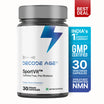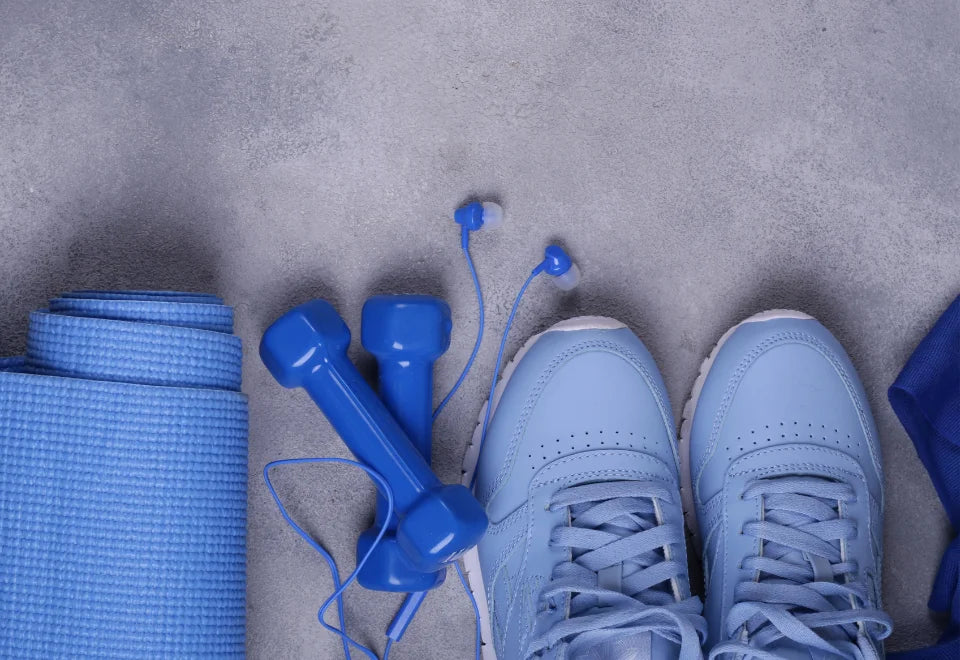Did you know you can slow down - or even reverse - how your body ages? Your biological age, which reflects how your cells are ageing, can be younger than your actual age with the right lifestyle changes. Here’s how:
- Exercise: Just 90 minutes of strength training weekly can reduce biological age by nearly 4 years.
- Diet: Cutting 10 grams of added sugar daily can reverse biological age by 2.4 months over time.
- Sleep & Stress: Sleeping 7–9 hours and managing stress with mindfulness can slow cellular ageing.
- Testing: Tools like DNA methylation tests or blood-based tests can measure your biological age and track progress.
Your habits hold the key - genetics only influence 15–25% of ageing. By focusing on diet, exercise, sleep, and stress, you can take control of your biological age and improve your long-term health.
Biological Age Basics
Defining Biological Age
Chronological age counts the years you've been alive, but biological age reveals the actual condition of your body. Dr. Francisco Lopez-Jimenez explains that biological age reflects how a person is ageing based on various factors and biomarkers, offering a clearer picture of overall health. It measures the cumulative damage and decline occurring in your cells over time [1].
"When we talk about the difference between biological and chronological ageing, we are talking about how some people age more or less than others. Understanding why this happens will help us unlock how people can live longer and better." - Dr. Lopez-Jimenez
Health Effects of Biological Age
Biological age is a powerful indicator of disease risk. It not only tracks how you're ageing but also predicts potential health challenges. Research highlights strong connections between faster biological ageing and numerous health conditions. For example, individuals with accelerated ageing in any organ faced higher risks for 30 out of 45 age-related diseases studied.
Some specific health impacts of advanced biological age include:
| Condition | Impact of Accelerated Biological Age |
|---|---|
| Ischemic Stroke | 29.2% higher risk per standard deviation of advanced ageing [2] |
| Dementia | 29.7% increased risk per standard deviation in methylation age advancement [2] |
| Heart Disease | Greater heart-age gap correlates with higher cardiovascular risk |
"This type of blood test could be a game-changer in preventive medicine, particularly in longevity-focused healthcare. By identifying organ-specific ageing early, clinicians could implement targeted interventions - such as lifestyle modifications, medications, or regenerative therapies - before disease manifests." - Sebnem Unluisler [2]
What sets biological age apart is that it can be influenced. While genetics play a role, they only account for about 15% to 25% of the ageing process. This means your lifestyle choices hold significant power in shaping your biological age, laying the groundwork for strategies to slow or even reverse the ageing process.
Three Key Lifestyle Changes to Lower Biological Age
Diet Changes That Slow Ageing
What you eat has a direct impact on how your cells age. Choosing nutrient-packed foods and cutting out harmful additives can help reduce your biological age.
Research suggests that cutting just 10 grams of added sugar daily can reverse biological ageing by 2.4 months over time. As Dr. Barbara Laraia explains:
"Given that epigenetic patterns appear to be reversible, it may be that eliminating 10 grams of added sugar per day is akin to turning back the biological clock by 2.4 months, if sustained over time. Focusing on foods that are high in key nutrients and low in added sugars may be a new way to help motivate people to eat well for longevity."
Here’s a quick look at diets that promote longevity:
| Diet Type | Key Components | Benefits |
|---|---|---|
| Mediterranean | Olive oil, vegetables, legumes | Supports heart health [3] |
| Okinawan | Whole grains, vegetables, soy, omega-3 rich fish | Linked to the longest lifespan globally; 40% fewer calories consumed than the average American diet [3] |
| Anti-Ageing | Antioxidant-rich foods, healthy fats | Protects cells and boosts skin health |
For the best results, aim to include one source of protein, one healthy fat, and 1–2 vegetables in each meal. Also, keep daily added sugar intake under 50 grams.
But diet alone isn’t enough - exercise is another powerful tool for slowing down the ageing process.
Best Exercises for Ageing Well
A 2023 CDC study revealed that just 90 minutes of strength training per week could lead to a nearly four-year reduction in biological age [4]. Muscle loss speeds up after age 35, but consistent strength training can help counteract this.
"The results of these studies are really exciting because they highlight that fundamental processes related to cellular ageing may be modifiable with lifestyle interventions, such as exercise." [5]
Here’s how to use exercise to lower your biological age:
- Strength training: Aim for 2–3 sessions per week using weights or resistance bands.
- Daily movement: Activities like walking or gardening keep you active.
- Flexibility work: Incorporate yoga or tai chi to improve mobility and reduce stiffness.
Exercise alone won’t do the trick - good sleep and stress management are also critical.
Sleep Quality and Stress Control
Getting less than five hours of sleep per night can speed up ageing at the cellular level [6] [7].
"In order to help the body cope with stressors, rest and sleep are essential because when we sleep, we are also fasting. This triggers the body's in-built cellular waste removal system, which slows down the rate at which we age."
"I have found that stress increases one's biological age and can be positively impacted or restored by incorporating a healthy mental and physical lifestyle. Paying attention to one's mindset is also extremely powerful in reducing stress which ultimately positively impacts the body."
To manage stress and improve sleep quality, try these techniques:
- Practice daily mindfulness meditation
- Use deep breathing exercises
- Stay socially connected
- Add yoga to your routine
Better sleep and reduced stress can help reverse cellular damage caused by ageing.
sbb-itb-55c436e
Measuring Your Results
Modern tests now allow you to track how lifestyle changes affect your ageing process. By measuring your biological age, you can see the impact of improvements in your diet, exercise, and sleep routines.
Testing Options Available Now
DNA methylation tests are widely regarded as the most precise method for measuring biological age. These tests analyze chemical changes in your DNA, which act as reliable markers of ageing.
Here’s a quick comparison of popular biological age tests:
| Test Type | Accuracy | What It Measures |
|---|---|---|
| DNA Methylation | Highest | Chemical tags on DNA |
| Blood Biomarkers | High | 25+ health indicators |
| Telomere Length | Moderate | Ends of chromosomes |
| Phenotypic Age | Moderate | Combined health metrics |
Blood biomarker testing stands out for its precision, with results showing a range of up to 20 years younger or older than your chronological age [8].
These tests can help guide adjustments to your lifestyle for better ageing outcomes.
Making Changes Based on Test Results
Your test results can serve as a roadmap to refine your habits. Higher biological age scores suggest faster ageing, while lower scores indicate slower ageing.
Dr. Jessie Poganik from Harvard Medical School explains:
"There are a bajillion of these tests out there. We will get to the point where they are useful tools for individual people. We aren't quite there, but it is just a matter of time."
To make the most of your results:
- Track progress: Test every 6–12 months to monitor trends and make adjustments as needed.
- Combine methods: Using multiple testing approaches can provide a more complete picture.
Research highlights how lifestyle choices influence DNA methylation patterns:
- Smoking and inactivity accelerate ageing.
- Nutrient-rich diets and maintaining a healthy weight slows ageing markers.
- Regular exercise improves biological ageing metrics.
Keep in mind, biological age testing is still advancing. Consult healthcare professionals to interpret your results and develop a tailored plan that aligns with your health goals.
Custom Health Plans for Ageing
Personalized health plans are changing the way we approach ageing by using advanced biomarker testing to create targeted solutions. These plans analyze over 70 health markers to catch early signs of ageing that standard medical exams might overlook.
Here’s a quick breakdown of how these plans work:
| Component | Purpose | Benefits |
|---|---|---|
| Biomarker Testing | Examines 70+ health markers | Pinpoints specific ageing factors |
| Gut Microbiome Analysis | Assesses digestive health | Offers tailored nutrition advice |
| Lifestyle Assessment | Reviews daily habits | Suggests practical, lasting changes |
| Supplement Protocol | Tackles deficiencies | Boosts cellular health |
Next Steps for Better Ageing
Making consistent lifestyle changes can help reduce your biological age. For instance, a 2023 study revealed that people with optimal cardiovascular health had biological ages six years younger than their actual age.
Here are some practical strategies to support your journey:
- Exercise Smart: Dedicate at least 90 minutes each week to strength training.
- Upgrade Your Diet: Gradually replace refined sugars and processed foods with nutrient-rich options.
Regular testing can help you fine-tune your approach and monitor progress. As Steve Matheson says:
"If you don't measure it, you can't manage it."
Conclusion
Your biological age is not set in stone. With the right lifestyle choices, you can actively slow down or even reverse the ageing process. Research shows that habits like strength training, a nutrient-rich diet, quality sleep, and stress management play key roles in determining how well you age. Since genetics only account for 15-25% of the ageing process, your daily habits hold significant power over your long-term health.
Modern testing options, such as DNA methylation and blood biomarker tests, provide a clearer picture of your biological age and offer actionable insights into how to improve it. Personalized health plans are now integrating biomarker analysis, gut microbiome testing, and tailored lifestyle recommendations to help individuals optimize their ageing process.
The key takeaway? Small, consistent changes add up. Start by implementing one positive habit today, track your progress, and gradually incorporate more healthy choices into your lifestyle. Over time, these efforts can lead to a longer, healthier, and more vibrant life.
FAQs
What is biological age?
Biological age measures how well your cells and organs are functioning compared to your chronological age. It considers factors like DNA methylation, blood biomarkers, and lifestyle habits.
What foods help reduce biological age?
A diet rich in antioxidants, healthy fats, and low in added sugars supports cellular health. The Mediterranean and Okinawan diets have been linked to longevity.
How does stress impact ageing?
Chronic stress accelerates biological ageing by increasing inflammation and oxidative stress. Mindfulness, meditation, and social connections help counteract these effects.























Leave a comment
All comments are moderated before being published.
This site is protected by hCaptcha and the hCaptcha Privacy Policy and Terms of Service apply.